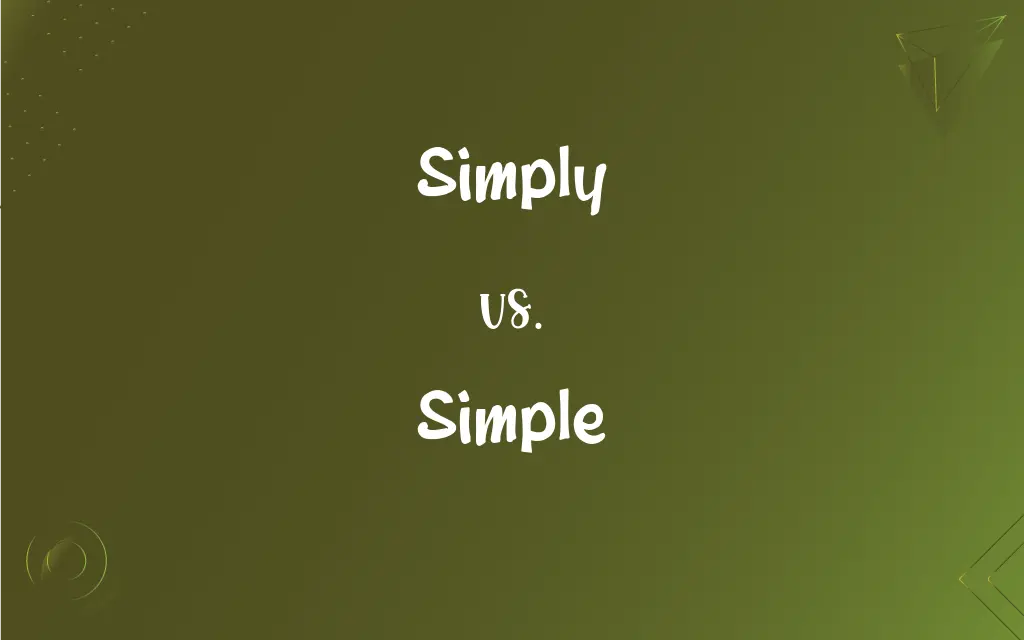Simply vs. Simple: What's the Difference?
Edited by Aimie Carlson || By Harlon Moss || Updated on November 6, 2023
'Simply' is an adverb meaning 'in a straightforward or plain manner,' while 'simple' is an adjective meaning 'easily understood or not complicated.'

Key Differences
The word 'simply' functions as an adverb, implying that something is done in an uncomplicated manner or plainly. It suggests that the action or concept it describes is straightforward and without additional effort or complexity. Conversely, 'simple' is an adjective that describes the nature of a noun as being uncomplicated, easy to understand, or not elaborate. While 'simply' modifies verbs, adjectives, or other adverbs, 'simple' directly modifies nouns.
When using 'simply,' you indicate the manner in which something is performed or exists. For example, if one says, "She simply refused to go," it underscores the straightforward nature of the refusal. 'Simple,' however, would describe a subject or object as uncomplicated, such as in "a simple tool." In this case, 'simple' characterizes the tool as easy to use or understand.
The adverb 'simply' can also serve to emphasize a point or statement. It's commonly used for clarity or to express a strong opinion, as in, "I simply cannot agree with you." 'Simple,' meanwhile, might qualify a concept or object in a variety of contexts, indicating that it is unadorned or fundamental, for instance, "He preferred a simple lifestyle."
In addition, 'simply' is often employed in instructive language to assure the listener or reader that a task is not difficult, such as in, "To open the app, simply click on the icon." In contrast, calling something 'simple' may imply a lack of sophistication or features, which can be either positive or negative based on the context, like saying, "The instructions were simple and easy to follow."
'Simply' can also be synonymous with 'merely' or 'just,' when it is used to minimize the perceived importance or complexity of something, for example, "It's simply a matter of time." On the other hand, calling something 'simple' can sometimes have a connotation of elegance or beauty in minimalism, such as in the phrase "the simple beauty of the poem."
ADVERTISEMENT
Comparison Chart
Part of Speech
Adverb
Adjective
Function
Modifies verbs, adjectives, or other adverbs
Modifies nouns
Usage
To indicate manner, clarity, or emphasis
To describe something as uncomplicated or fundamental
Synonyms
Plainly, merely, just
Uncomplicated, elementary, straightforward
Example Sentence
She can simply walk away from the problem.
He prefers a simple solution to the problem.
ADVERTISEMENT
Simply and Simple Definitions
Simply
Without doubt; clearly.
The answer is simply obvious to anyone who looks closely.
Simple
Easily understood or done.
It's a simple task for an experienced mechanic.
Simply
Used for emphasis.
She simply ignored all my calls.
Simple
Plain, basic, or uncomplicated in form.
She wore a simple black dress.
Simply
In a straightforward or clear manner.
Simply press the button to start.
Simple
Referring to the fundamental or base level of something.
They solved the problem using simple math.
Simply
Absolutely or completely.
This is simply the best cake I've ever had.
Simple
Not complex or fancy; unadorned.
They enjoyed a simple meal together.
Simply
Merely or just.
I am simply trying to help.
Simple
Without much decoration or unnecessary additions.
His writing style is simple but powerful.
Simply
In a plain and unadorned way
Dresses simply.
Simple
Having few parts or features; not complicated or elaborate
A house with a simple floor plan.
Simply
In an unambiguous way; clearly
Explained the concept simply.
Simple
Easy to understand, do, or carry out
A simple set of instructions.
A simple chore.
FAQs
What does 'simply' mean?
It means done in a straightforward, plain, or clear manner.
Can 'simple' be used to describe people?
It can, but it may be seen as offensive, implying lack of intelligence.
Is 'simple' a noun or adjective?
'Simple' is an adjective.
Can 'simple' refer to a lifestyle?
Yes, it can describe a lifestyle that is uncomplicated.
Can 'simply' be used in formal writing?
Yes, it is appropriate in both formal and informal contexts.
Can 'simply' mean the same as 'just'?
Yes, 'simply' can be synonymous with 'just.'
What does 'simple' describe?
It describes something as uncomplicated or not elaborate.
Is 'simply' ever used for emphasis?
Yes, it can emphasize the ease or clarity of something.
How is 'simple' correctly used in a sentence?
As an adjective, e.g., "She likes simple designs."
Can 'simple' have a positive connotation?
Yes, it can suggest elegance or efficiency.
What part of speech is 'simply'?
'Simply' is an adverb.
Can 'simply' modify an adjective?
Yes, as in "simply amazing."
How do you use 'simply' in a sentence?
As an adverb, e.g., "He simply walked away."
Can both 'simply' and 'simple' be used in the same sentence?
Yes, when appropriate, e.g., "The solution is simply to adopt a simple approach."
Do 'simply' and 'simple' mean the same thing?
No, they do not. They are different parts of speech with related but distinct meanings.
Is 'simple' ever used in a negative way?
It can be, to suggest something is too basic or lacking sophistication.
What is an antonym for 'simple'?
'Complex' or 'complicated' can be antonyms.
Does 'simple' always mean something is easy?
Often, but it can also mean it's fundamental or not complex without implying ease.
Can 'simply' make a sentence negative?
It can, depending on context, e.g., "I cannot simply forget what happened."
What is a synonym for 'simply'?
'Merely' is a common synonym.
About Author
Written by
Harlon MossHarlon is a seasoned quality moderator and accomplished content writer for Difference Wiki. An alumnus of the prestigious University of California, he earned his degree in Computer Science. Leveraging his academic background, Harlon brings a meticulous and informed perspective to his work, ensuring content accuracy and excellence.
Edited by
Aimie CarlsonAimie Carlson, holding a master's degree in English literature, is a fervent English language enthusiast. She lends her writing talents to Difference Wiki, a prominent website that specializes in comparisons, offering readers insightful analyses that both captivate and inform.































































